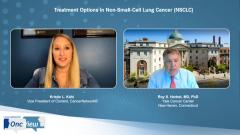
Clinical Decision-Making in NSCLC
Roy S. Herbst, MD, PhD, shares insight on approaching clinical decision-making for the length of immunotherapy treatment and drug holidays for patients with NSCLC.
Episodes in this series

Kristie Kahl: We have other aspects that go into clinical decisions. First, how do you handle when a patient might request a drug holiday?
Roy S. Herbst, MD, PhD: Everyone likes holidays, right? Immunotherapy is amazing. I’ve been treating lung cancer for 25 to 30 years, and only in the last decade have I seen the amazing results of immunotherapy. If someone has undergone treatment for a year or 2 and they’re stable and doing well, coming every 3 weeks is tough. These drugs produce some fatigue and adverse effects, so why not stop? If a patient is stable, with no evidence of disease, and they want to take a holiday, I’ll usually let them do it. I base this on KEYNOTE-010 and KEYNOTE-024. I was actually the primary author of KEYNOTE-010. We just published the 5-year outcome in the Journal of Thoracic Oncology. For patients who had a partial response and got through 2 years, few of them relapsed; only 10% to 15% so far. Of patients who do relapse, more than half respond again if you give back the pembrolizumab.
My thought is many of these patients could be—do I say cured?—after 2 years. If they’re not, we know we can rescue them or at least stabilize the disease by giving immunotherapy again. I’m a proponent of stopping therapy if we can. For some patients, the tumor has responded, but they have 1 area that’s growing oligometastatic disease. I’ve had some cases where I’ve radiated or done surgery and then stopped the drug or gone on with immunotherapy a little longer until things are stable. You have to assess on a case-by-case basis. Many will tell you to treat until progression, but if the patient has gone a couple of years and had a good response, it’s OK to stop.
Kristie Kahl: Is there any information out there that makes this an easier decision for you?
Roy S. Herbst, MD, PhD: There are very few studies. A couple of studies looked at treatment for a year vs to progression. This was with nivolumab. I think the data slightly favored treating longer. We need more data. We need ctDNA [circulating tumor DNA] data. It’s very hard to do a randomized trial—suppose you were the patient who gets the group that stops at 1 year vs who keeps going and you’re doing well. How would 1 feel? These are hard studies. We’ll learn more by looking molecularly at ctDNA, looking at how much tumor burden there is in a more molecular way, so stay tuned in the next couple of months to a year.
Kristie Kahl: Absolutely. You touched on this already. We typically treat with immunotherapy for 2 years. Do we always need to treat for the full 2 years, or is it beneficial to treat for longer?
Roy S. Herbst, MD, PhD: We don’t know. That’s the problem. I’ve had patients I’ve treated for 3 or 4 months. They’ve had a great response, but they’ve also had toxicity. They’ve had to stop the pembrolizumab. They’re alive 5, 6 years later, so they obviously readjusted their [INAUDIBLE] immune system; that was enough. Then I’ve had patients I’ve treated for several years where they’ve never had a partial response, but they’ve been stable. I’ve had some patients whom I have had on therapy for more than 3 or 4 years. At 3 or 4 years, most patients will say, “Doctor, can I have a little break?”
Kristie Kahl: You mentioned that we need more information to make this decision and that hopefully, ctDNA will get us there. Is there any other information or testing that might support this decision?
Roy S. Herbst, MD, PhD: Well, imaging-more than just CT [(computed tomography]) imaging, maybe PET [(positron emission tomography]) scanning. I would predict at some point we’ll have ways to file T -cells in the immune microenvironment and label CD8+ T -cells and look at those or label PD-L1 so we can look at the immune microenvironment in a patient. That might help us determine sites and areas of embers and tumors that still have not been totally eradicated.
Kristie Kahl: Absolutely. Thank you so much, Dr Herbst.
Roy S. Herbst, MD, PhD: It’s been a pleasure chatting with you. It’s an exciting area when you have drugs at work. Of course, we have to hone in and figure out whom they work best and use them more. There are some patients where if we know that it’s not going to work, then research has to look for combinations of drugs and therapies.
We just presented some very nice data at ESMO [European Society for Medical Oncology Congress] in which we used durvalumab postchemotherapy radiation, for example. We combined durvalumab with 2 experimental agents. One agent targets CD73, and another targets natural killer cells. In both cases, the results look better than the durvalumab alone. I predict that in the next few years, we’re going to start seeing new immune combinations that can be used in these settings.
Kristie Kahl: Thank you. Thank you all for watching our CancerNetwork® OncView program from MJH Life Sciences. We hope you found this to be valuable to your clinical practice.
Transcript Edited for Clarity
Newsletter
Stay up to date on recent advances in the multidisciplinary approach to cancer.






































